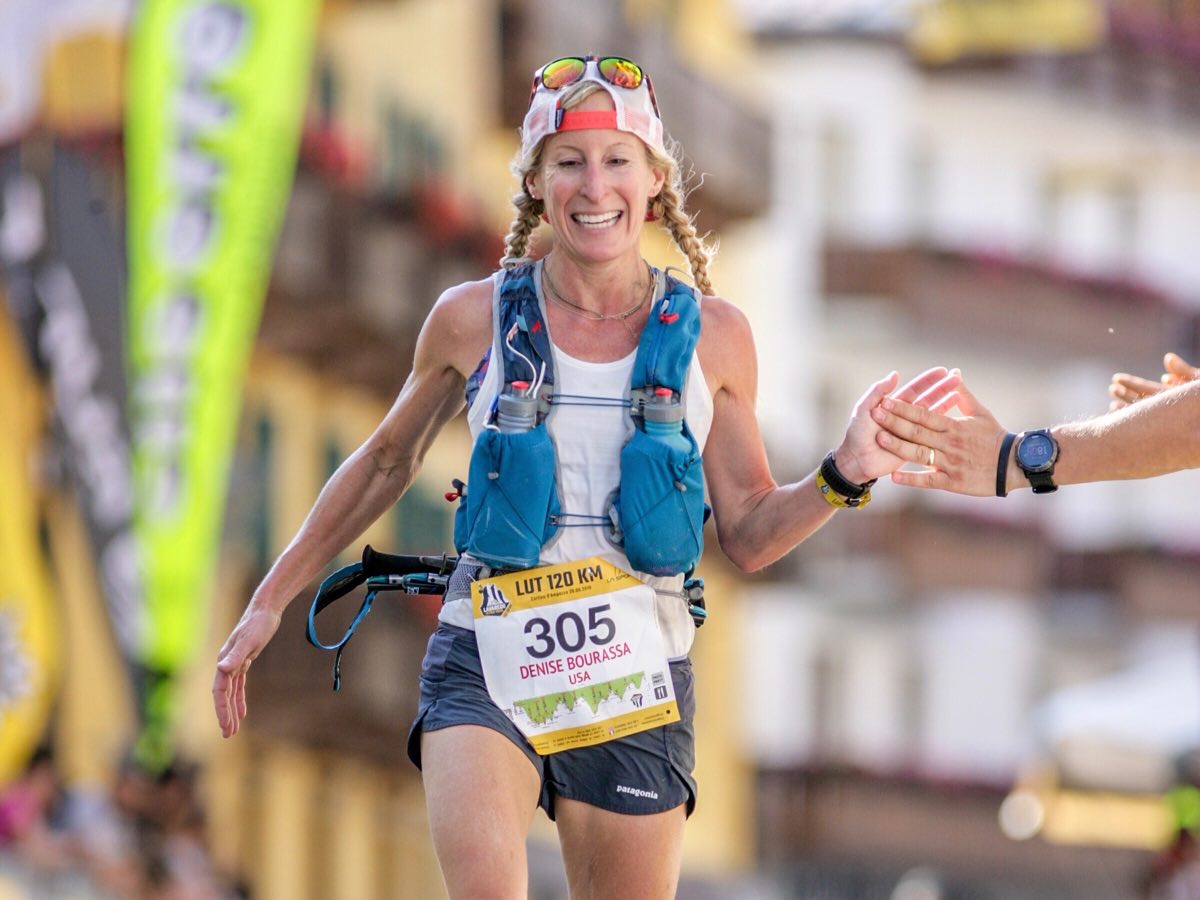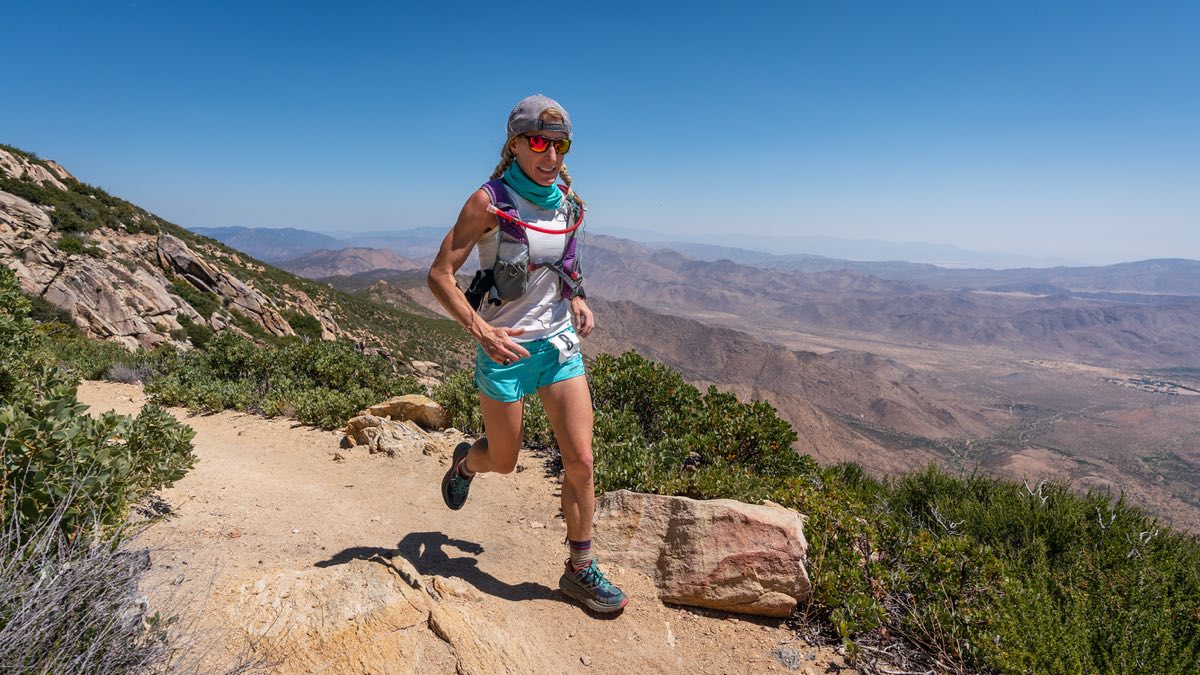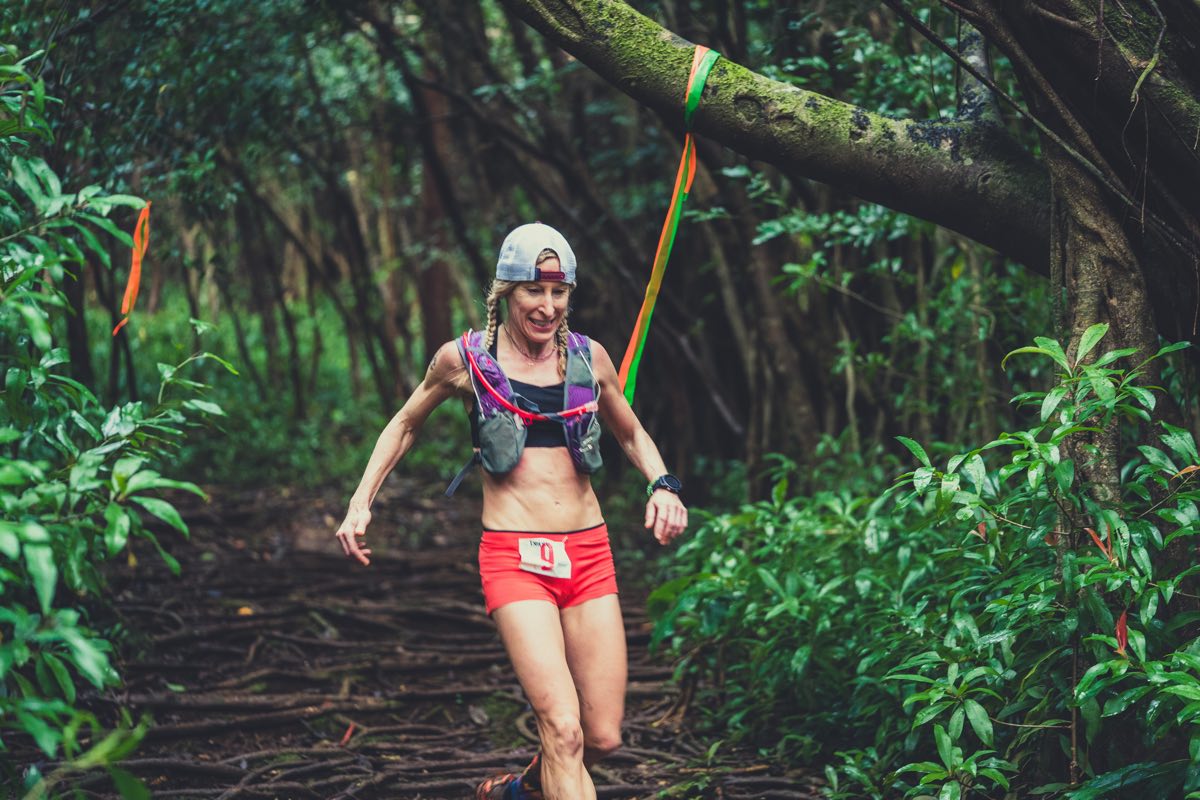‘Age-Old Runners’ is an article series where we explore runners’ performance potential after the age of 45 by interviewing excellent middle-aged runners. Is there still potential to improve? What roles do motivation, mindset, and specific training and recovery techniques play in allowing runners in their mid-40s to mid-60s to continue to excel? To learn more about this series’ goals, check out its introductory article.
Denise Bourassa is 50 years old. She started running marathons when she was 29, and began ultrarunning 10 years later when she was 39. Since then, she’s won and podiumed at races consistently. She’s won the Ice Age 50 Mile the Pinhoti 100 Mile, and she holds the women’s masters record for the Grand Slam of Ultrarunning, which she set in 2014 at age 44. Since turning 45, she’s won the HURT 100 Mile, and won or placed top three at 19 other ultramarathons.
The following is a transcript of a phone interview with Denise. It has been edited for brevity and clarity.
You are 50. How do you see your potential as a runner?
If I’ve run a race previously, then my expectation is to do better than my previous attempt. Not to say my previous attempt was a bad one, but that’s the expectation I have of myself. It is reasonable? I think so. There’s so much more to a race than an athlete being at their ‘A’ performance physically.
At the [2019] Javelina 100 Mile, I was hopeful to have a fast race. Right now, I want to say my 100-mile PR is 19 hours over at Pinhoti. And I definitely thought, No, I should be 18 [hours]. I see that as a very reasonable goal for me. Yeah, I would say putting together a good race is where I see potential.
This 2020 race season, I have the HURT 100 as the kickoff to my year. Not for a moment am I thinking, Oh, well, my fastest time is 31 hours, so likely I’m going to be in the thirties. I want to get under 30 hours. I still believe I haven’t put together the race to get there. It’s just putting together a good race. That’s all.
Do you have an age in your head when you expect to slow significantly?
I don’t. I go one race at a time, one year at a time. Meghan Laws is a great example of that. She’s not, “Oh, look at my age, I’m no longer going to have these goals.” It’s like: My goal is there, and we’ll see what happens. It still comes down to going into races healthy, and being physically and mentally fit for it.
I’m in the health-care field; I work in surgery, and people are always like, “Oh Denise, you’re going to have to get your knees and hips replaced.” Basically, in a couple of years, I should be the bionic woman if I listen to everybody because my body is supposed to fall apart.
Obviously if we were doing 5ks, 10ks, half marathons, and marathons, that’s definitely something you can pinpoint and say, “You know what? I peaked here.” The body has its limitations as we age, for sure. But with 100 miles, the 100k, and endurance racing, there’s more to it than a young or old body.
How will your running change when you’re not able to podium anymore?
When I can’t be competitive, I see adventures that will still fulfill me. I can’t be competitive forever, and when I reach that point, I think the love of the sport will keep me involved.
I absolutely love the ultrarunning community and the family I’ve developed along the way. I think I’m going to be okay with not being competitive. I’m not there yet, but I think I will be okay because there’s so much more to it than racing. It’s the camaraderie, friendships, and people you meet along the way. And it’s the sport itself.
Yeah, when the natural progression starts for me, I’ll be okay. My involvement still will be there. How? I’m not sure. It’ll be there though.
Are age-group records motivating?
It’s something I look at. You know, I’ll run a race and it’s like, “Oh I was the first 50-year-old.” But I don’t know that [age-group records] will be something I’ll chase. I think a sense of accomplishment is absolutely there. Because I’m not the 22-year-old or the 32-year-old or even the 42-year-old out there any more. I’m the 50-year-old. And it does factor in. I’m not going to say that it’s the end all, but it certainly is a factor that plays into race performance.
What distresses you about getting older?
Oh, what doesn’t?!
I like to have control. I like to know what to expect. I like to have plan in place and see it through. Part of aging is that you don’t get to lay out exactly how it’s going to progress.
On injury and aging
It can be something as simple as [getting a small injury from] wearing high-heeled boots that I don’t normally wear. I wore them to a function, got home, and, as I was taking the boot off, felt pain in my ankle. I still feel that pain, and it’s been over a week. That’s an example of: What the heck is that all about? Where did that come from? Did I have something that’s been just kind of nagging in there? … Do I blame that on age, or was that just something I did wearing a pair of boots that I hadn’t worn for a while?
Also, I was at work and I pulled my groin. We did an ultrasound and ruled out a tear and hernia. It was a week before Javelina [earlier this fall]. At the race, it started getting tighter and tighter. And finally, I was like, I’m only at mile 50; it’s not likely it’s going to get better in 50 miles. So for me, DNFing made sense. But did that occur because of a 50-year-old body that had a work-related injury that wouldn’t have happened if I was in my thirties? This may be the aging process, or it may be a stupid, random injury.
So my angst about aging is just relative to the unknown of it.
On thinking about age during a race
Sometimes I’m like, “Am I not being as mentally tough because now this idea of age is hanging over me?” That’s a concern. I’d say that’s a concern that I still am true to myself when I race for my ability. And to not let that age be something I use as a crutch.
I was not as spry last year [at the HURT 100.] The girls in front of me were little 25- and 26-year-olds who were moving through the mud a lot faster than me. Was that because I was 49 and they were 20 years younger than me? Maybe. Maybe that’s an easy excuse for my brain to accept when I’m having an off race.
What physical changes have you noticed as a runner?
When you’re running and you look down and you’re like, “Is that my leg wrinkling? Why isn’t my skin attached to my quad?”
How do you feel when runners comment on your age?
The majority of people, when they hear that I’m 50, are like, “Oh my god! You’re 50?” It feels kind of good. … It makes me feel proud. I’m 50, and I’m still doing what I love, and I’m still effective at it. I say it out loud, and it’s like, “Holy crap! Am I 50?” I absolutely don’t feel 50.
How long have you been training at your current volume and intensity? What is your ‘running age?’
I ran my first marathon in 1998. I can’t even tell you how many I’ve run. I was running probably around 50-ish miles a week. Maybe around 60 when I ran marathons. And then, 2008 was my first ultra race. Now I would probably say I run between 40 and 80 miles a week. [Author’s Note: So Denise is about 21 years old as a runner.]
Looking back, would you change anything about how you trained?
I don’t think so. I see these young athletes who are able to take time off and spend a great deal of time in the area that they’re going to race. … If I were to go back, maybe I would have selected one race that was my A race and said, “I’m going to give this my undivided attention.”
But I think I’m pretty happy. I wouldn’t say that I overtrained or under-trained. I wouldn’t say I have it nailed 100% by any means, but I think, for me and where I am, it was effective.
What do attribute being able to run this well for this long to?
I don’t have a routine eating habit. I don’t have a strict diet dialed in for what I need to have prior to or after a race. I definitely have things that I focus on, but it’s nothing magical. After any hard-intensity race or run, I do use a Hammer Recoverite powder. I make sure that I’m putting protein in my smoothies.
On diet
It’s very boring. My smoothies are boring. I’ll do yogurt and almond milk, the Recoverite powder, a protein powder, frozen bananas, and frozen strawberries. It’s my go-to. I don’t have a special diet. I don’t eat red meat before a race because I don’t digest it as well. Definitely, I’m into the pastas and white meat. I don’t eat a lot of red meat, but sometimes I’ll crave it. Last night, I had a buffalo patty.
On strength training
That has always been part of what I’ve done. I see plenty of other runners who are very effective, and I don’t know that they do strength training. But I feel, for me, it’s beneficial.
I’ve always kept a core routine as well as an upper-body routine. I’ve just joined a gym and hired a personal trainer to help me work on my legs because I’ve never really worked them. I have things that I feel like I could correct if I had stronger quads, hamstrings, and glutes.
Yeah, I would say having a balanced body versus just running legs is beneficial, especially in trail running. Has it helped prevent injury? I don’t know. I think it’s helped me. Mentally and physically, it feels right to me.
I’ll generally do workout, which is about a 10- to 15-minute core workout, and then I’ll do upper body. Now I’m working with a trainer, and so I’m incorporating some of the lower-body workouts that they’re giving me. Before, I would go in three days a week, and I would do the same exact thing every single time: pushups, dips, dumbbells, lats, and then my core routine. Done. And I wasn’t really focusing on push-pull. So that’s been what I’ve been working with the trainer on and incorporating the lower-extremity workouts that will build strength in my glutes and my hamstrings.
On sleep
That’s the concern with the graveyard shift I work. I have no idea what I’m getting right now. When I’m not on shift, I try to establish something semi-normal. But I wake up multiple times at night.
I want to say I get often get six hours. On the weekend, I won’t set an alarm. Like tomorrow, I’ll just stay in bed until my body says it’s time to get up. This morning I stayed in bed until 10 a.m., but I don’t think I went to bed until midnight.
Has your motivation to train and race hard changed since you started running?
No. You know, I put pressure on myself to perform well, and I know what I need to do to get there. The only time that I have those lulls is when I don’t have a race on the calendar.
If I weren’t racing, I wouldn’t be running as much. It’s a focus that I enjoy. It’s the discipline with my body that I enjoy.
Yeah, I could back off on my races, but, for me, racing and running go hand in hand. If I’m running, I’m racing. If I’m not racing, I’m probably not running as much. And I enjoy running. So I’m going to run, and I’m going to race.
You’re still just as happy to hurt and suffer?
I wouldn’t say ‘happy.’ Thinking about the [upcoming] HURT 100 is daunting.
What does your recovery after a 100-mile race look like?
I’ll take at least seven to 10 days off for sure.
Something that I have been doing consistently that I absolutely love is the Epsom salt soak. It’s what I do after long runs, up-tempo workouts, and races. In Hawaii, I’ll buy Epsom salt and I will soak after the HURT 100. I don’t have the tolerance for the ice baths. I’m a big baby. And there may be benefit there, but there’s also benefit with a warm, Epsom salt soak.
Training specifics:
- Weekly running volume: Forty to 80 miles per week
- Speedwork: Up-tempo runs once a week
- Strength training: About 40 minutes 3 times/week
- Sleep: Varies with graveyard shift work
- Race nutrition: Spring Energy Gels; Hammer Recoverite post-run
- Recovery: Seven to 10 days off after 100 milers
Three factors Denise attributes her running performance to:
- Scheduling races to ensure consistent training
- Continuing to enjoy training and racing
- Epsom salt soaks (and probably strength training)



